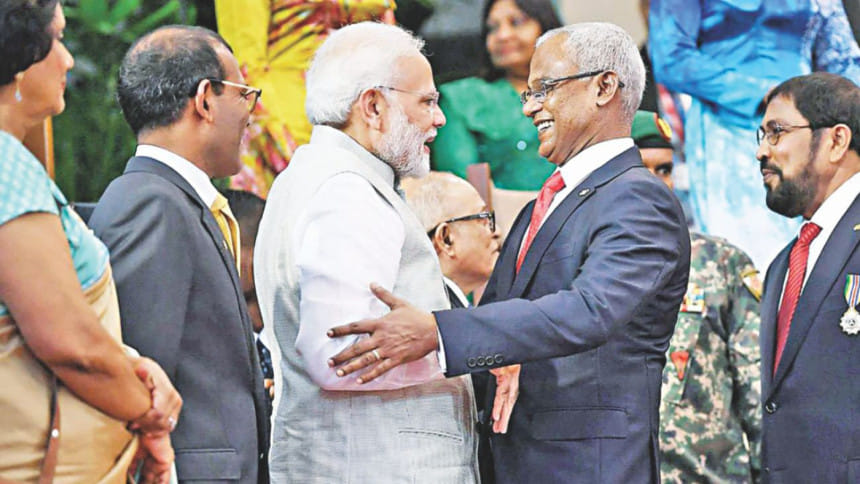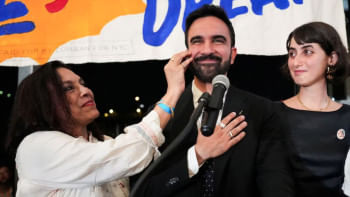Significance of Modi's visit

Resilience and renewal—these two words at the beginning of the joint statement issued after Indian Prime Minister Narendra Modi's dialogue with Maldivian President Ibrahim Mohamed Solih in Male on November 17 succinctly captured the essence of relations between the two countries that had been under considerable strain in the last three years during the rule of former President Abdullah Yameen.
Yameen, who was defeated by Solih in the September Presidential Elections by the Maldives Democratic Party (MDP) lawmaker, had rebuffed India as well as the United States and Britain a number of times on a number of issues by jailing opposition politicians and Supreme Court judges, and imposing a state of emergency defying repeated appeals to respect the basic tenets of democracy. He riled India by moving decisively towards China, entering into a free trade agreement with the latter, allowing three Chinese Navy ships to dock at Male in August 2017, and by asking India to withdraw some of its defence helicopters and personnel from the Maldives even though they were there at the Maldivian government's request.
So strong was the feeling of affront in certain quarters in India that it was suggested that New Delhi be assertive in hitting back at the Yameen government. However, India kept its cool allowing the political developments in the Maldives to run its own course and reach a logical conclusion. India has learnt lessons from the resentment in Nepal in 2015 created by the perception created in the Himalayan country that New Delhi was behind the economic blockade along the India-Nepal border.
Modi was in the Maldives to attend the anointment of Solih as president and the Indian External Affairs Ministry made it clear last week that it was not a bilateral visit by the Indian Prime Minister to the island nation. Yet two important points should not escape notice: i) it was for the first time Modi attended the swearing in of a foreign head of state or government and; ii) it had two key ingredients of a bilateral official visit—formal talks between the two leaders and a customary joint statement that accompanies such visits. That is what lent substance to Modi's visit beyond the optics and feel-good atmospherics provided by Modi's famous bear hug of Solih, and of Modi sitting between two former presidents of Maldives, Mohd Nasheed and Maumoon Abdul Gayoom, the two political rivals who had joined hands to put up Solih as the common presidential candidate to run against Yameen.
Modi's first visit to the island nation—his previous decision to do so in 2015 had to be abandoned due to the political turmoil in the Maldives which was the only country he had been to before as part of New Delhi's "neighbourhood first" policy—clearly signalled India's determination to reset bilateral relations, temporary disruptions notwithstanding. It was reciprocated in equal measure by Solih. In his very first speech to the "majlis" (national parliament) as president, the only country which found mention in Solih's speech was India when he said, "we will fortify existing ties with India." Interestingly, this part of his speech was described as a "special moment" by the spokesman of the Indian External Affairs Minister in his Twitter post. In the run up to the Presidential Elections, he had talked about restoring Maldives' "India first" policy in response to Modi's neighbourhood first stance.
Two key parts of the joint statement gave clear pointers to the direction India-Maldives relations would take under Solih's stewardship. Immediately after the reference to "resilience and renewal" in bilateral relations in the third paragraph of the statement comes the declaration by both countries that "during their meeting, both leaders agreed on the importance of maintaining peace and security in the Indian Ocean and being mindful of each other's concerns and aspirations for the stability of the region." This has to be seen in the context of India's concerns over China's increased presence in the Indian Ocean region.
The Abdullah Yameen government had allowed mega investments running into millions of dollars by Chinese companies in a series of infrastructure projects in the Maldives which also saw Male leasing large chunks of land to those companies.
The second part of the joint statement relates to the economic content of bilateral ties. During his talks with Modi, Solih sought Indian assistance to cope with the "dire economic situation" facing the Maldives as he took office and the two leaders discussed ways in which India can continue the development partnership, particularly to help the new dispensation in that country meet its pledges to the people. Solih highlighted the pressing need for increased housing and infrastructure and setting up water and sewerage systems in the outlying islands of the Maldives. The Indian prime minister assured Solih of India's firm commitment in assisting the Maldives. Modi also pointed to the "expanding opportunities" for Indian companies to invest in the Maldives in different sectors—which translates into India's footprints growing in a country where China had taken a lead in the last three years.
Pallab Bhattacharya is a special correspondent at The Daily Star.









Comments